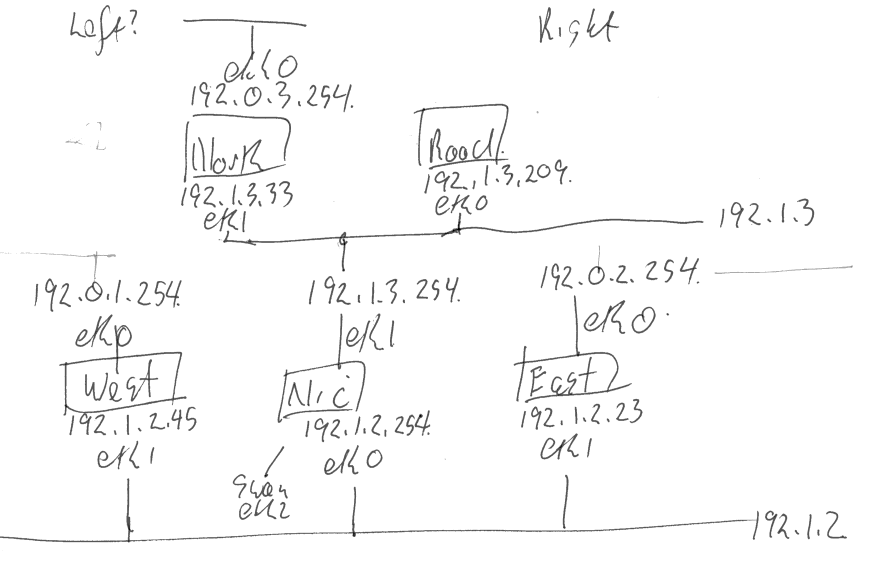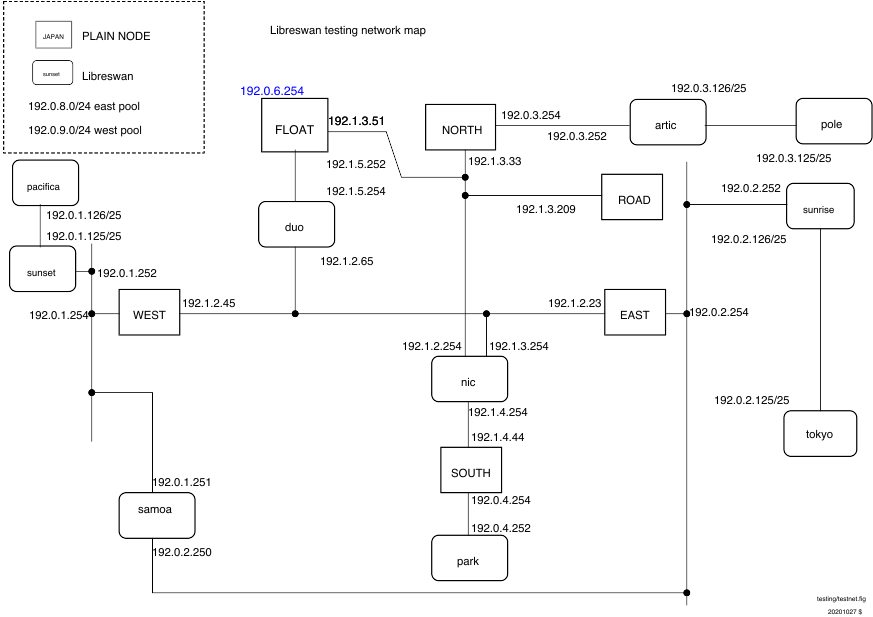Test Suite
Jump to navigation
Jump to search
Nightly Test Tesults
Libreswan's testsuite is run nightly. The results are published here, with the most recent result here. The tests are categorized as:
- good: these tests are expected to pass (unfortunately, some still have timing problems and occasionally fail)
- wip: these tests require further work, for instance the result may not be deterministic, or the bug they demonstrate hasn't yet been fixed
- skiptest: these tests require manual intervention to run
To run tests locally, read on.
Running tests
The libreswan tests, in testing/pluto, can be run using several different mechanisms:
| Framework | Speed | Host OS | Guest OS | initsystem testing (systemd, rc.d, ...) | Post-mortem | Interop testing | Notes |
|---|---|---|---|---|---|---|---|
| KVM | slower | Fedora, Debian (BSD anyone?) |
Alpine, Fedora, FreeBSD, NetBSD, OpenBSD, Debian | yes | shutdown, core, leaks, refcnt, selinux | strongswan (Linux, FreeBSD), iked (OpenBSD), racoon (NetBSD), racoon2 (NetBSD) | gold standard ideal for BSD builds idea for testing custom kernels used by the Testing machine requires 9p (virtio anyone?) |
| Namespaces | fast | linux | uses host's libreswan, kernel, and utilities | no | core, leaks | strongswan (linux)? | ideal for quick tests requires libreswan to be built/installed on the host requires all dependencies to be installed on the host test results sensitive differing kernel and utilities |
| Docker | linux | uses host's kernel uses distro's utilities |
? | ? | ? | ideal for cross-linux builds (CentOS 6, 7, 8, Fedora 28 - rawhide, Debian, Ubuntu) sensitive to differing kernel and utilities |
How tests work
All the test cases involving VMs are located in the libreswan directory under testing/pluto/. The most basic test case is called basic-pluto-01. Each test case consists of a few files:
- description.txt to explain what this test case actually tests
- ipsec.conf files - for host west is called west.conf. This can also include configuration files for strongswan or racoon2 for interop testig
- ipsec.secret files - if non-default configurations are used. also uses the host syntax, eg west.secrets, east.secrets.
- An init.sh file for each VM that needs to start (eg westinit.sh, eastinit.sh, etc)
- One run.sh file for the host that is the initiator (eg westrun.sh)
- Known good (sanitized) output for each VM (eg west.console.txt, east.console.txt)
- testparams.sh if there are any non-default test parameters
Once the test run has completed, you will see an OUTPUT/ directory in the test case directory:
$ ls OUTPUT/ east.console.diff east.console.verbose.txt RESULT west.console.txt west.pluto.log east.console.txt east.pluto.log swan12.pcap west.console.diff west.console.verbose.txt
- RESULT is a text file (whose format is sure to change in the next few months) stating whether the test succeeded or failed.
- The diff files show the differences between this testrun and the last known good output.
- Each VM's serial (sanitized) console log (eg west.console.txt)
- Each VM's unsanitized verbose console output (eg west.console.verbose.txt)
- A network capture from the bridge device (eg swan12.pcap)
- Each VM's pluto log, created with plutodebug=all (eg west.pluto.log)
- Any core dumps generated if a pluto daemon crashed
- testing/baseconfigs/
- configuration files installed on guest machines
- testing/guestbin/
- shell scripts used by tests, and run on the guest
- testing/linux-system-roles.vpn/
- ???
- testing/packaging/
- ???
- testing/pluto/TESTLIST
- list of tests, and their expected outcome
- testing/pluto/*/
- individual test directories
- testing/programs/
- executables used by tests, and run on the guest
- testing/sanitizers/
- filters for cleaning up the test output
- testing/utils/
- test drivers and other host tools
- testing/x509/
- certificates, scripts are run on a guest
Network Diagram
- interface-0 (eth0, vio0, vioif0) is connected to SWANDEFAULT which has a NAT gateway to the internet
- the exceptions are the Linux test domains: EAST, WEST, ROAD, NORTH; should they?
- the BSD domains always up inteface-0 so that /pool, /source, and /testing can be NFS mounted
- NIC needs to run DHCP on eth0 manually; how?
- transmogrify does not try to modify interface-0(SWANDEFAULT) (doing so would break established network sessions such as NFS)
- the interface names do not have consistent order (see comment above about Fedora's interface-0 not pointing at SWANDEFAULT)
- Fedora has ethN
- OpenBSD has vioN (different order)
- NetBSD has vioifN (different order)
LEFT RIGHT
192.0.3.0/24 -------------------------------------+-- 2001:db8:0:3::/64
|
2001:db8:0:3::254
192.0.3.254(eth0)
ROAD NORTH
192.1.3.209(eth0) 192.1.3.33(eth1)
2001:db8:1:3::209 2001:db8:1:3::33
| |
192.1.3.0/24 -----+----------------+--------------+-- 2001:db8:1:3::/64
|
2001:db8:1:3::254
192.1.3.254(eth2)
NIC---swandefault(0)
192.1.2.254(eth1)
2001:db8:1:2::254
|
192.1.2.0/24 ---+------------------+-------------+--- 2001:db8:1:2::/64
| |
2001:db8:1:2::45 2001:db8:1:2::23
192.1.2.45(eth1) 192.1.2.23(eth1)
WEST EAST
192.0.1.254(eth0) 192.0.2.254(eth0)
2001:db8:0:1::254 2001:db8:0:2::254
| |
| TEST-NET-1
| 192.0.2.0/24 ----+--- 2001:db8:0:2::/64
|
192.0.1.0/24 ---+------------------------------------ 2001:db8:0:1::/64
Problems with the existing Network
The current network has a number of limitations. This section identifies those problems and proposes changes to address them:
- the network addresses being used are not really suitable for use in documentation
- the RFCs recommend a number of addresses to use in documentation, by using these in tests it will be possible to directly lift examples from working test cases
- IPv4 192.0.2.0/24 aka TEST-NET-1, 198.51.100.0/24 aka TEST-NET-2, 203.0.113.0/24 aka TEST-NET-3, see https://www.rfc-editor.org/rfc/rfc5737
- IPv6 2001:DB8::/32 see https://www.rfc-editor.org/rfc/rfc3849
- look for documentation in https://www.rfc-editor.org/rfc/rfc6890
- two hosts, each behind a gateway, where the gateway's are connected using IPsec
- HOST-<unencrypted>-GATEWAY-<IPsec>-GATEWAY-unencrypted>-HOST
- tests try to mimic this by injecting packets into gateway's internal interface, however it isn't the same
- the OS specific VMs (NetBSD, Alpine, Debian, FreeBSD, OpenBSD, Fedora) have no consistent home
- currently they are kind of like east, west, and north
LEFT RIGHT
192.0.3.0/24 -------------------------------------+------
2001:db8:0:3::/64 |
2001:db8:0:3::254
192.0.3.254(eth0)
ROAD NORTH
192.1.3.209(eth0) 192.1.3.33(eth1)
2001:db8:1:3::209 2001:db8:1:3::33
| |
192.1.3.0/254 ---------+----------------+---------+------
2001:db8:1:3::/64 |
2001:db8:1:3::254
192.1.3.254(eth2)
NIC---swandefault(0)
192.1.2.254(eth1)
2001:db8:1:2::254
|
TEST-NET-1 |
192.0.2.0/24 -----------------+---------+-------------------+-----
2001:db8:0:2::/64 | |
| |
2001:db8:1:2::45 2001:db8:1:2::23
192.1.2.45(eth1) 192.1.2.23(eth1)
$(OS)W--if0-swandefault-if0--${OS}E
WEST EAST
192.0.1.254(eth0/2) 192.0.2.254(eth0/2)
2001:db8:0:1::254 2001:db8:0:2::254
| |
TEST-NET-2 | |
198.51.100.0/28 ----------+---+----------- |
2001:db8:51:100::/64 | |
| |
${OS}SET |
|
TEST-NET-3 |
203.0.113.0/28 ---------------------------------------------+---+---
2001:db8:0:113::/64 |
${OS}RISE
The changes are as follows:
- behind EAST renumber its network to TEST-NET-3 and add the machine $(OS)RISE
- behind WEST renumber its network to TeST-NET-3 and add the machine $(OS)SET
- between EAST and WEST renumber the network to TEST-NET-1
- behind NIC, consider renumbering the network to one of the reserved for home use / nats 192.168 / or 10.0....

